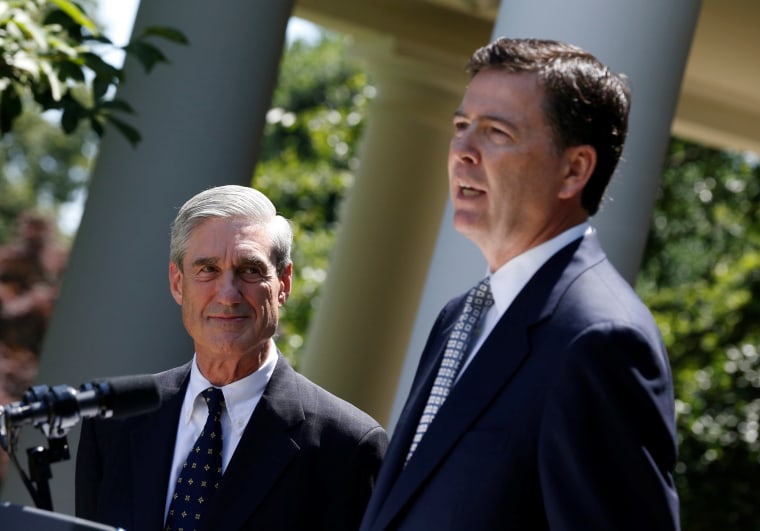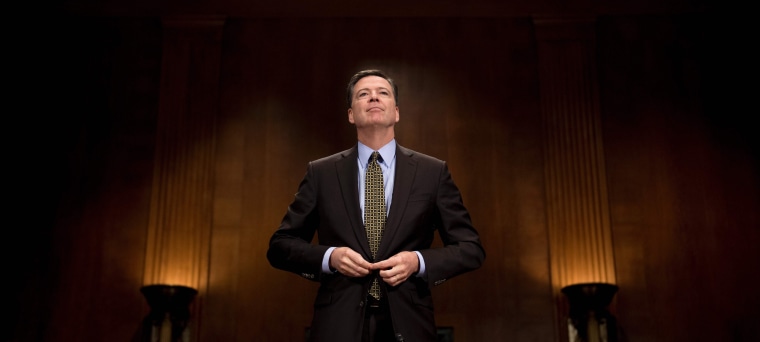President Donald Trump's closest advisers told him that firing FBI Director James Comey would be good politics.
Two people familiar with the matter say it was Trump's son-in-law, Jared Kushner, and chief of staff Reince Priebus who assured him the move would be hailed by Democrats still mad at how Comey handled the Hillary Clinton email probe.
The president is about to experience, yet again, the pitfalls of heeding their advice.
Comey, a physically imposing former prosecutor who exudes moral rectitude and speaks with a persuasive eloquence, is slated to appear before the Senate Intelligence Committee Thursday in what could be the most dramatic Congressional hearing since the Iran-Contra scandal of the 1980s — if not the Watergate affair of the 1970s.
He will stride into the hearing room one day after his prepared testimony was released at his own request, ensuring that his account of his interactions with Trump would dominate not just one news cycle, but two.
In a dramatic and detailed written account, Comey said he told Trump that he personally was not under investigation, confirming an assertion by the president that many people had doubted.
But Comey also made a series of damaging allegations. Not only did Comey say that Trump pushed him to drop the probe into former National Security Advisor Mike Flynn, but he also said Trump had called the FBI's whole Russia investigation a "cloud" on his presidency — and then pressured him to "lift the cloud." Comey stopped short, however, of accusing the president of obstruction of justice.
Related: Comey To Testify He Assured Trump He Was Not Personally Under Investigation
Comey's statement also refers to a previously reported one-on-one dinner he had with Trump in the White House, in which he says the president asked for his loyalty and that he replied he could only offer honesty.
According to Comey, the president said, "I need loyalty, I expect loyalty."
Comey wrote, "I didn't move, speak, or change my facial expression in any way during the awkward silence that followed. We simply looked at each other in silence. The conversation then moved on, but he returned to the subject near the end of our dinner."
Later, Comey said he explained "why it was so important that the FBI and the Department of Justice be independent of the White House. I said it was a paradox: Throughout history, some presidents have decided that because 'problems' come from Justice, they should try to hold the Department close. But blurring those boundaries ultimately makes the problems worse by undermining public trust in the institutions and their work."
Related: My Dinner With Comey: Clapper, Others Dispute Trump Account of Comey Meeting
Comey also confirmed an earlier news report that Trump pressured him into dropping the FBI investigation of Flynn, pressure Comey considered inappropriate.
"I had understood the president to be requesting that we drop any investigation of Flynn in connection with false statements about his conversations with the Russian ambassador in December," Comey wrote. "I did not understand the president to be talking about the broader investigation into Russia or possible links to his campaign… Regardless, it was very concerning, given the FBI's role as an independent investigative agency."
Comey said he and his aides at the FBI decided not to report the conversation to the Justice Department.
"After discussing the matter, we decided to keep it very closely held, resolving to figure out what to do with it down the road as our investigation progressed," he wrote.
"He said he had nothing to do with Russia."
However, Comey said he did report to the acting attorney general another conversation with the president, on March 30. In that conversation, Comey says Trump repeatedly asked him to get the word out that he was not being investigated. That came after Comey revealed to the public that the FBI was investigating whether the Trump campaign colluded with the Russian election interference effort.
"He described the Russia investigation as 'a cloud' that was impairing his ability to act on behalf of the country," Comey wrote. "He said he had nothing to do with Russia, had not been involved with hookers in Russia, and had always assumed he was being recorded when in Russia."
Trump, Comey continued, "asked what we could do to 'lift the cloud.' I responded that we were investigating the matter as quickly as we could, and that there would be great benefit, if we didn't find anything, to our having done the work well. He agreed, but then re-emphasized the problems this was causing him."
Comey added that he "did not tell the president that the FBI and the Department of Justice had been reluctant to make public statements that we did not have an open case on president Trump for a number of reasons, most importantly because it would create a duty to correct, should that change."
Comey's last interaction with Trump came on the morning of April 11, when he says, "The president called me and asked what I had done about his request that I 'get out' that he is not personally under investigation.
"I replied that I had passed his request to the Acting Deputy Attorney General, but I had not heard back. He replied that 'the cloud' was getting in the way of his ability to do his job."

Comey has been "cleared for takeoff" by Special Counsel Robert Mueller to detail his interactions with the president, a former law enforcement official close to him says. One remaining question is whether he has any new information to share outside of his prepared testimony.
He said he had nine interactions with Trump, but his testimony describes only five.
Comey's testimony is not likely to sit well with lawmakers of either party, given that many Republicans, including Trump allies, expressed dismay over Comey's abrupt firing last month. Democrats were incensed.
What about the American public? It's one thing for people to read a story about a president allegedly violating the post-Watergate norms that the White House should not interfere in a criminal investigation. It's another to have a respected former public servant who has served Democrats and Republicans make the charge, in detail, on live television.
"I don't know if we're going to learn substantial new facts, but I think one thing we will certainly learn is how Jim Comey experienced this set of events as they unfolded," said Benjamin Wittes, a senior fellow at the Brookings Institution and a Comey friend. "If you're trying to understand how inappropriate the president's behavior was, this is one very important component."
The Republican Response
Trump allies don't plan to let Comey's testimony go unrebutted. A source familiar with the planning told NBC News the Republican National Committee will lead a rapid response, and observers expect that Trump may tweet during the hearing. Sen. John Cornyn, a Texas Republican and Trump backer, told NBC News he plans to ask Comey about actions he took related to Hillary Clinton's use of private email.
Comey also will no doubt be asked: If the president's requests to you were so unseemly, why did you not resign?
Some critics point to his May 3 testimony before the Senate, when he was asked if the attorney general or senior officials at the Department of Justice could "halt that FBI investigation."
"In theory, yes," he replied, but said it hadn't happened "in my experience. Because it would be a big deal to tell the FBI to stop doing something that — without an appropriate purpose. I mean where oftentimes they give us opinions that 'we don't see a case there and so you ought to stop investing resources in it.' But I'm talking about a situation where we were told to stop something for a political reason, that would be a very big deal. It's not happened in my experience."
Related: Coats, Rogers Won't Discuss Talks With Trump About Russia Probe
Of course, Comey was not talking about the president. And even so, Wittes said he would be surprised if Comey accused Trump of having sought to obstruct justice. Not only would Comey be unlikely to willingly render such a legal conclusion, he said, it's not consistent with what Comey told him about how things unfolded from January 20th until his May firing.
Wittes and another Comey friend, who declined to be named, each said that Comey found many of his interactions with Trump to have been troubling and inappropriate, which is one reason he documented them in writing. Comey seemed to suggest as much in his prepared statement, noting that he did not feel the need to document his two one-on-one conversations with President Obama.
However, the sources close to Comey said, the FBI director concluded he could manage the situation and remain independent. Wittes said Comey felt after a time that he had "trained" the White House that certain requests of the FBI were out of bounds and that the president and his people should remain at arms-length from criminal investigations.
Obviously, Comey misjudged where things stood. He learned of his firing from a television news broadcast as he spoke at an FBI office in Los Angeles.
Trump's chief of staff, Reince Priebus, and his son-in-law and senior adviser Jared Kushner had told the president Comey's sacking would be applauded by Democrats who reviled Comey for his treatment of Clinton prior to the election, two people familiar with the matter told NBC News.
"This is still pretty thin soup for a criminal case."
Instead, Democrats were apoplectic, accusing Trump of trying to impede the FBI's investigation into whether his campaign colluded with Russia. Even Republicans were upset.
"I am troubled by the timing and reasoning of Director Comey's termination," Senate Intelligence Chairman Richard Burr, a North Carolina Republican, said in a statement.
Jonathan Turley, a law professor at George Washington University, cautioned that it's possible that the Comey hearing could be a letdown.
Trump has behaved so grossly inappropriately on so many issues since he fired Comey, Turley said, that the public may in some sense be inured to more revelations.
What's more, he added, "obstruction of justice is made of something more than the grossly inappropriate. Making a prosecutable case for obstruction is difficult. This is still pretty thin soup for a criminal case."
The question, Wittes said, is whether Trump's interactions with Comey, plus firing him, plus allegedly boasting to the Russian foreign minister about doing so, adds up to a pattern of obstruction.
Add to that the president's requests to two senior intelligence officials that they state publicly that they have seen no collusion between the Trump campaign and Russia — requests both NSA Director Mike Rogers and DNI Dan Coats are said to have found grossly inappropriate.
The bottom line, Wittes said, is that "for the fair-minded person who wants to understand the nature of the man we've elected to the presidency, hearing from Jim Comey about his interactions with Donald Trump is going to be a very important moment."

